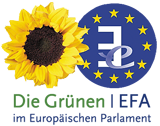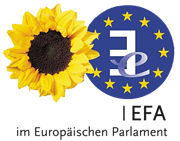Rebecca Harms im Deutsche Welle-Interview: Die Fraktionsvorsitzende der Grünen im Europäischen Parlament, Rebecca Harms, macht die Separatisten für den Flugzeug-Abschuss verantwortlich. Sie fordert eine internationale Kontrolle der ukrainisch-russischen Grenze.
Im Gespräch mit Roman Goncharenko
DW: Sie kamen in die Ukraine (vom 18.07. bis 21.07.2014, Anm. der Red.) direkt nach der Flugzeugkatastrophe. Haben Sie nach Abschluss Ihrer Reise eine Antwort auf die Schuldfrage?
Rebecca Harms: Im Osten der Ukraine ist zuletzt immer wieder auf ukrainische Militärflugzeuge geschossen worden. Bisher waren es immer die selbsternannten Separatisten, die mit russischen Spezialwaffen diese Flugzeuge zum Absturz gebracht haben. Aller Wahrscheinlichkeit nach, haben sie Recht, die sagen, die Separatisten haben auch die malaysische Maschine abgeschossen. Auch die Blockade der Unfallstelle, die Tatsache, dass diese Freischärler nicht zulassen, dass Angehörige und internationale Experten zum Unfallort kommen – all das spricht eher dafür, dass da Spuren verwischt werden sollen.
Wo waren Sie in der Ukraine? Was hat Sie dort besonders beeindruckt?
Die Reise in den Osten der Ukraine war noch vor der Flugzeugkatastrophe geplant. Ich wollte besser verstehen, wie dort über Demokratie und die neue Regierung gedacht wird. Doch das ist jetzt alles überschattet von den Eindrücken des Krieges im östlichsten Teil der Ukraine. Wie in Charkiw. Da sieht man normales Leben, aber Freunde, die ich sehr lange kenne, sagen mir, es gibt immer noch diese Spannung zwischen denjenigen, die russische Politik richtig finden, und denjenigen, die Kiew unterstützen. Es gibt große Ängste. Charkiw liegt nah an der russischen Grenze und dem Kriegsgebiet. Menschen hören nachts oft die Geräusche von den großen Panzereinheiten, die da bewegt werden.
Dann gibt es viele Menschen die sagen, wir wollen nicht akzeptieren, dass Russland entscheidet, was Ukraine ist und was nicht. Diese Menschen sind bereit, für ihr Land zu kämpfen. Gleichzeitig wird immer wieder gesagt, dass niemand diesen Krieg wollte, dass man da herein gezwungen wird von den selbsternannten Separatisten, die wiederum Unterstützung aus Russland bekommen. Es ist wie eine Falle, die man der Ukraine aufgestellt hat: Man erwartet, dass der Westen endlich mehr tut, um Präsident Putin klar zu machen, dass man nicht einen weiteren eingefrorenen Konflikt akzeptieren will.
Was sagen die Menschen in der Stadt Slawjansk, das bis vor kurzem eine Hochburg der Separatisten war?
Man kann nicht aus einzelnen Gesprächen aufs Ganze schließen. Aber das erste, was mir von Passanten gesagt wurde, ist, man bete, dass so etwas nie wieder passiert. Ich habe gesehen, dass viele Menschen in Slawjansk die ukrainischen Soldaten unterstützen wollen. Die Kritik an Kiew geht aber auch weiter. Ein Bekenntnis zu Ukraine ist nicht gleichzeitig ein Bekenntnis zu allem, was Poroschenko und Jazenjuk in Kiew machen.
In der Ukraine ist viel von einer "Wende" die Rede. Haben Sie das gespürt?
Einige Soldaten aus einem Freiwilligenbataillon in Artjomowsk haben mir erzählt, dass die Reaktionen in der Stadt auf sie sehr positiv sind, dass die Leute ihnen zu essen geben, dass Taxifahrer sie umsonst durch die Stadt fahren. Ich glaube, dass das Ende des Faustrechts das da herrschte, das Ende der früheren Rechtslosigkeit, eine Hinwendung zu Ukraine bedeuten kann. So wurden zum Beispiel Menschen, die ihre Autos den Separatisten nicht übergeben wollten, bedroht, sie fühlten sich ausgeraubt. Was ich aber bestürzend finde, ist, dass wir bisher noch keine Antwort haben darauf, wie wir diese Falle, die militärische Eskalation, die von Außen in die Ukraine hineingetragen worden ist, in den Griff bekommen sollen. Dafür braucht die Ukraine eine konsequentere Unterstützung durch die Europäer.
Wird es neue Sanktionen seitens der EU geben?
Es mag zynisch klingen, aber die Staats- und Regierungschefs erleben jetzt in wenigen Stunden das, was die Menschen in der Ukraine schon seit Monaten erleben. Merkel und Putin haben aus Brasilien Poroschenko aufgefordert, mit den selbsternannten Separatisten zu verhandeln. Jetzt stellen alle Staatschefs in Europa fest, dass sie gesetzlose, unmoralische Milizionäre sind, mit denen man auch gar nicht reden kann. Ich komme zurück mit zwei Hauptanliegen. Diese Entwicklung in den Krieg darf nicht automatisch sein. Die Idee, dass die russisch-ukrainische Grenze dicht gemacht werden muss, ist für mich die Wichtigste. Wenn die Zustimmung Russlands dafür durch Sanktionen besser zu bekommen ist, dann bin ich sofort dafür.
________________________________________________
Ukraine - Rebecca Harms: 'They're covering the tracks'
Rebecca Harms, co-chairwoman of the Greens in the European Parliament, believes the separatists were behind the shooting down of flight MH17. She also calls for international control of the Ukrainian-Russian border.
The interview was conducted by Roman Goncharenko.
DW: You went to Ukraine right after the plane crash in the east of the country (18.-21.07.2014). Have you got a clearer sense of who was behind it?
Rebecca Harms: There have been several incidents lately where Ukrainian army jets were shot down in eastern Ukraine. In those cases it was always the self-proclaimed separatists who brought those planes down with Russian special weapons systems. It is looking increasingly likely that whoever says the separatists shot down the Malaysian plane is right. The blockage of the crash site, the fact that those franctireurs didn't allow relatives and international experts to access the site – all of that seems to suggest that they're trying to cover the tracks.
Where exactly did you go in Ukraine? What impressed you most?
I had planned this trip to eastern Ukraine before the plane disaster. I'd wanted to get a better idea of what people there are thinking about democracy and the new government. That's all overshadowed now by the war in the easternmost part of Ukraine. One example is the city of Kharkiv. Life does go on there, but friends in the region whom I've known for a long time have told me that there is still a lot of tension between those who support Russian policies and those who support Kyiv. There is a lot of fear. Kharkiv is close to the Russian border and the warzone. At night, people there often hear the sounds from the big tank units that are being moved.
There are also a lot of people who say they don't want to respect that Russia decides what is Ukrainian territory and what isn't. They're ready to fight for their country. At the same time, they say nobody wanted this war, and that the self-proclaimed separatists who have Russia's support left them with no choice but to get involved. They feel like somebody set Ukraine up. They expect the West to do more and at last send a clear message to President Putin that they're not willing to accept another frozen conflict.
And what do people in the city of Slovyansk say, which until a short while ago was a separatist stronghold?
Of course you can't make general assumptions based on individual conversations. But the first thing I heard from people there was 'We pray that something like this never happens again.' I saw how many people in Slovyansk want to support Ukrainian soldiers. But their criticism of the government in Kyiv continues as well. Saying that you support the Ukrainian side doesn't necessarily mean you support everything Mr Poroshenko and Mr Yatsenyuk are doing in Kyiv.
There is a lot of talk in Ukraine about a potential turning point. Did you feel that when you were there?
Soldiers from a voluntary battalion in Artyomovsk told me that the local population have reacted extremely positively to them, that they have received food from locals and that taxi drivers take them around town for free. I believe that the end of the rule of force there, the end of lawlessness can mean that people develop a stronger commitment to Ukraine. In the past, people who refused to hand over their cars to the separatists were threatened, and they felt robbed. But what I do find disconcerting is that we still don't have an answer to the question of how we can gain control of this trap, this military escalation which was forced upon Ukraine from outside. Europe needs to support Ukraine more consistently.
Will the EU tighten sanctions?
As cynical as that may sound: in the space of a few hours, the heads of state and government have now experienced what people in Ukraine have been experiencing for months. When they were in Brazil, Mrs Merkel and Mr Putin called on Mr Poroshenko to negotiate with the self-proclaimed separatists. And now it's dawning on all heads of state in Europe that those are lawless, unethical militia who you can't talk to. I've returned with two core demands. There must not be an automatic development into war. And to me, the most important idea is to close the Russian-Ukrainian border. If you can get Russia's consent to that more easily through sanctions then I'm all for it.
Rebecca Harms, 57, has been the group leader of the Greens in the European Parliament since 2010. She went to Ukraine in 1986 as an anti-nuclear campaigner after the atomic reactor disaster in Chernobyl and has visited the country many times since then.

